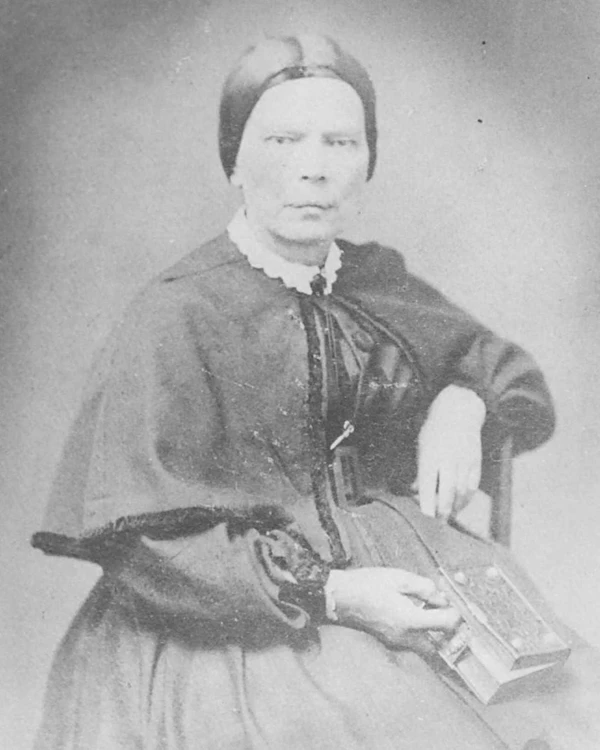Last updated: March 12, 2024
Person
Minerva McClatchey

Minerva Leah Rowles McClatchey was a wife, a mother of three sons, a writer, and a farmer. When the fighting came to her front door, she had no intention of leaving her plantation to be looted or burned by soldiers. So, she stayed in her Marietta home.
Her husband (who was ineligible for military service due to a disability) left with their slaves, livestock, and silver. Her oldest son joined the Confederate Army and died from a battle wound. Her middle son (who was also ineligible for military service due to a disability) stayed with her at the plantation. He often ran requests to and from military officers for his mom. Her youngest son was taken into service from the Georgia Military Institute at just 15 years old. He fought in the Atlanta Campaign at Resaca, New Hope Church, Kennesaw Mountain, Atlanta, Peachtree Creek, and Jonesboro.
As an avid writer, Minerva wrote many articles for journals and newspapers before the war. During the war, she wrote a diary, later published as “A Brief Journal of a Part of the Year in 1864.” From her diary, we learn that she was devoutly religious and truly conflicted by all the kindness shown her by many Union soldiers. She, her son, and her niece gather just enough food to survive by exchanging supplies with soldiers. Wounded soldiers walk to and from her house daily from the local make-shift hospital, and a Union doctor makes routine house calls, providing medicine when her son falls ill.
In Minerva’s words,
“July the 3rd … Firing ceased after a while – two were killed and buried near the house and several wounded and carried to the rear. Their limbs were amputated in Mr. Goodman’s yard. Genl. Hooker and his staff came up and by this time the whole face of the earth, as far as could be seen in the road, yard, garden, and lot – everywhere was crowded with soldiers. The officers, many of them came into the house and behaved gentlemanly towards us. They asked us thousands of questions about the army, the roads, and the way the army would go. Genl. Hooker came in and shook hands cordially as an old friend – saying he was glad to see a citizen at home, that all the houses he had passed were deserted and why was it that the inhabitants would run away from their friends. He supposed I did not believe all the tales I had heard about yankee cruelty, etc. I told him that this was my home – I had none other – and had stayed with the hope that all gentlemen and true soldiers would recognize a woman’s right to stay at home. 'You are right Madam – you have acted wisely and will be protected. We did not come to war with inoffensive citizens, but to preserve the Union and establish the authority of the Government. Let the rebels lay down their arms, and we give them the hand of friendship,' and much more in the same strain. Finally the Genl. left giving orders to some Captn. to place guards and have premises protected. I felt somewhat relieved supposing that General Hooker meant what he said.”
“Nov. 15th. Now they are all gone, I can but think of the terrors of last night. The Institute was on fire, a sick lad was here to stay with Mary – the officers were upstairs, so I knew the house was safe. Mr. Underwood said he would watch the door so Devereaux and I and a couple of the officers concluded we would go up on the hill and see the wretches at their work – at least that was my motive. Every house was in flames, it was as light as day. The houses in town were burning, many of them. Kinesaw mountain was in flames and as far as the eye could see the railroad was burning too and looked like a fiery serpent stretched through the darkness. Not a man was to be seen for sometime. We went all round the buildings, and finally saw about a half dozen very young soldiers, mere lads, who were doing the terrible work. I asked them if they liked to burn houses, they said 'No matter whether we like it or not we have to obey orders…'"
References:
T. Conn Bryan (Ed.) “A Georgia Woman’s Civil War Diary: The Journal of Minerva Leah Rowles McClatchey, 1864-65.” The GA Historical Quarterly Vol. 51, No. 2 (June, 1967), pp 197-216.
T. A Scott (Ed.) “Cornerstones of Georgia History: Documents That Formed the State.” University of Georgia Press. (Jan, 2011).
